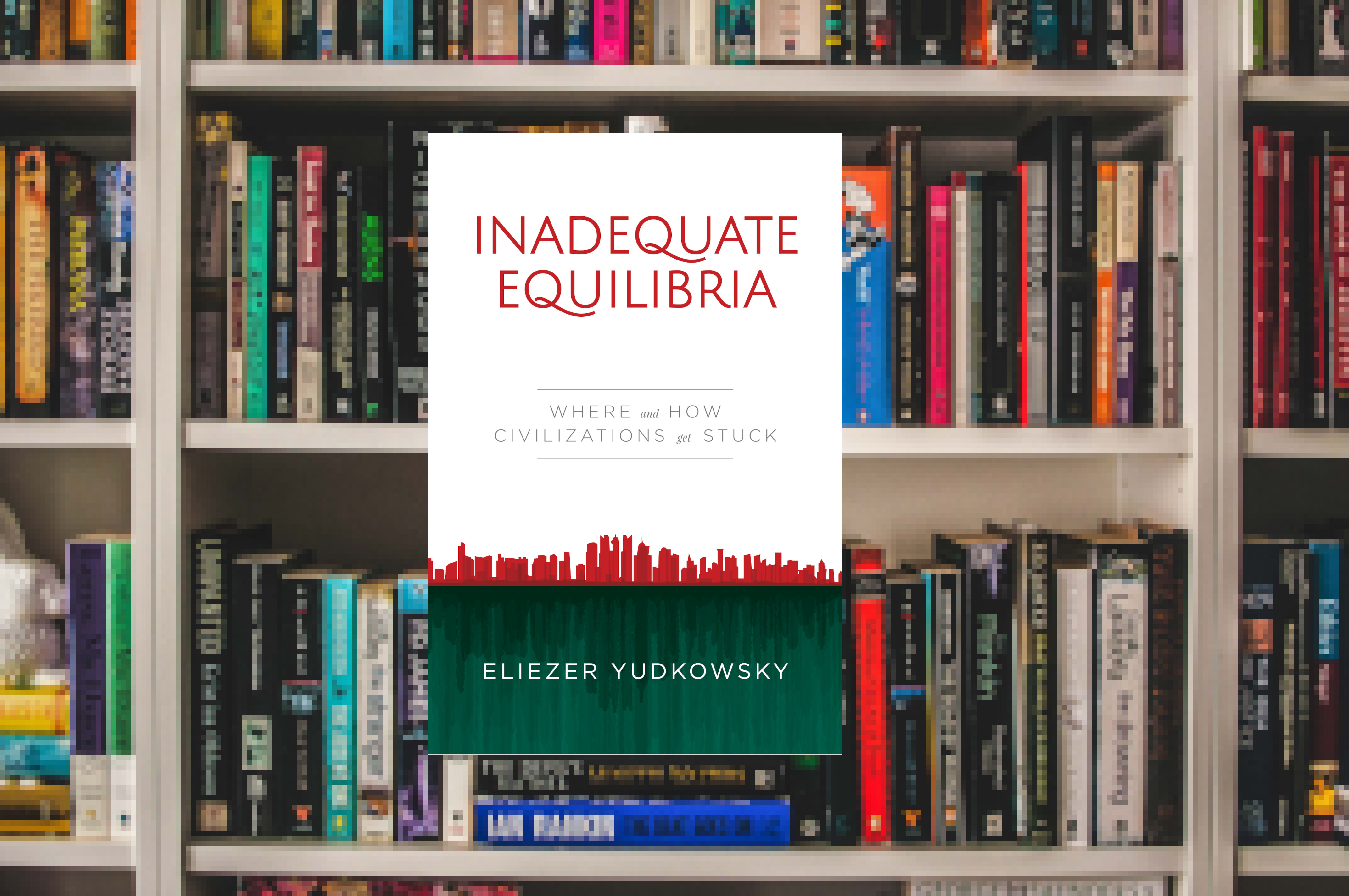
Understanding and Escaping Suboptimal States
"Inadequate Equilibria" is a book by Eliezer Yudkowsky that offers a unique perspective on how civilizations can get stuck in undesirable states and how we can potentially escape these situations. The concept of "inadequate equilibria" is central to Yudkowsky's analysis, and refers to situations where the actions of individuals or groups are not sufficient to move a system to a more desirable state.
In other words, inadequate equilibria are situations where the status quo is suboptimal, but the forces acting upon it are not strong enough to bring about change. This can happen in various contexts, such as societal, economic, or political, and can have significant consequences for the well-being and progress of a civilization.
Throughout the book, Yudkowsky delves into the causes and characteristics of inadequate equilibria, as well as strategies for escaping them. He draws on a wide range of examples and theories from various fields, including economics, psychology, and political science, to provide a nuanced and multidisciplinary analysis.
In this summary, we will explore the main ideas and arguments presented in "Inadequate Equilibria", with a focus on how the concept can help us understand and address some of the most pressing challenges facing our world today.
The Concept of "Inadequate Equilibria" Defined
To understand the concept of "inadequate equilibria", it's helpful to first define what we mean by an "equilibrium". In general, an equilibrium is a state in which the forces acting upon a system are balanced, resulting in no net change. This can be observed in various types of systems, from physical systems (e.g. a ball at the bottom of a valley) to social and economic systems (e.g. a market with supply and demand in balance).
In the context of "Inadequate Equilibria", Yudkowsky defines an equilibrium as a state in which the actions of individuals or groups are sufficient to maintain the status quo, but not sufficient to bring about significant change. This is in contrast to "good" equilibria, which are states that are both stable and desirable.
So, what makes an equilibrium "inadequate"? According to Yudkowsky, there are a few key characteristics that define an inadequate equilibrium:
Pervasiveness: Inadequate equilibria are often widespread and deeply ingrained in a system, rather than being confined to a specific area or issue.
Persistence: Inadequate equilibria tend to be resistant to change, even in the face of external pressures or incentives to do so.
Suboptimality: As the name suggests, inadequate equilibria represent suboptimal states, where the benefits of change outweigh the costs.
Some examples of inadequate equilibria that Yudkowsky discusses in the book include:
The "tragedy of the commons", where individuals acting in their own self-interest deplete a shared resource, despite the long-term negative consequences for the group as a whole.
Political polarization and gridlock, where extreme ideological positions and lack of compromise prevent progress on important issues.
The "winner's curse", where the winner of an auction ends up paying more for an item than it is worth, due to irrational bidding behavior.
These examples illustrate how inadequate equilibria can arise in a variety of contexts, and how they can have significant negative impacts on society and individuals.
Unpacking the Causes of Inadequate Equilibria
One of the key themes of "Inadequate Equilibria" is understanding the various factors that contribute to the emergence and persistence of inadequate equilibria. Yudkowsky identifies several key causes, which include:
Bounded rationality and cognitive biases: Humans are not always rational actors, and our decision-making is often influenced by cognitive biases and heuristics. For example, the "status quo bias" can lead us to stick with the current situation, even if there are potentially better options available. This can lead to suboptimal outcomes, as we make choices that are not in our best long-term interests.
Power dynamics and incentive structures: Inadequate equilibria can be maintained by power imbalances and the skewed distribution of resources. For example, a company with a monopoly in a market may have the ability to set prices at a level that is not in the best interests of consumers, but still attracts enough demand to maintain their dominant position.
Cultural and social factors: Societal norms, values, and beliefs can also play a role in maintaining inadequate equilibria. For example, a culture that stigmatizes mental health issues may discourage individuals from seeking help or support, even if it is necessary for their well-being. This can lead to a cycle of suffering and inadequate treatment.
Yudkowsky also discusses how these causes can interact and amplify each other, leading to even more entrenched and difficult-to-change inadequate equilibria.
It's important to note that while these causes can contribute to the emergence of inadequate equilibria, they are not the only factors at play. Yudkowsky argues that it is often a complex and dynamic interplay of multiple forces that leads to the development and persistence of inadequate equilibria.
Strategies for Breaking Free from Inadequate Equilibria
Given the negative impacts of inadequate equilibria on individuals and societies, it's important to consider how we can escape these situations and move towards more desirable states. Yudkowsky discusses several strategies for doing so:
Recognition and acknowledgement: A key first step in escaping an inadequate equilibrium is recognizing and acknowledging that it exists. This may require acknowledging uncomfortable truths or challenging our own biases and assumptions. For example, in order to address climate change, we may need to confront the fact that our current patterns of consumption and production are not sustainable, and that significant changes are needed.
Activism and intervention: Changing an inadequate equilibrium often requires active efforts to intervene and disrupt the status quo. This can take the form of individual or collective action, such as protesting, lobbying, or advocating for change. For example, the civil rights movement in the United States involved a range of activism and intervention efforts, including boycotts, sit-ins, and legislation, to bring about significant social and political change.
Changing the rules or structures: In some cases, the rules or structures that maintain an inadequate equilibrium may need to be altered in order to bring about change. This could involve reforms to laws, policies, or institutions, or the creation of new ones. For example, to address income inequality, we may need to implement policies such as progressive taxation or universal basic income, which change the way resources are distributed within a society.
It's worth noting that these strategies are not always easy or straightforward, and may require significant time and resources. Yudkowsky also acknowledges that there is no one-size-fits-all solution for escaping inadequate equilibria, and that different approaches may be needed in different contexts.
Ultimately, the goal of escaping inadequate equilibria is to move towards "good" equilibria, which are states that are both stable and desirable. This requires a combination of acknowledging the problems with the current state, taking action to bring about change, and finding ways to create more sustainable and beneficial outcomes for all involved.
Towards a Brighter Tomorrow
In "Inadequate Equilibria", Eliezer Yudkowsky offers a thought-provoking analysis of how civilizations can get stuck in undesirable states, and how we can potentially escape these situations. The concept of "inadequate equilibria" is central to this analysis, and refers to situations where the actions of individuals or groups are not sufficient to move a system to a more desirable state.
Through a multidisciplinary lens, Yudkowsky explores the various causes of inadequate equilibria, including bounded rationality and cognitive biases, power dynamics and incentive structures, and cultural and social factors. He also suggests strategies for escaping these equilibria, including recognition and acknowledgement, activism and intervention, and changing the rules or structures.
The ideas presented in "Inadequate Equilibria" offer a valuable perspective on how to understand and address some of the most pressing challenges facing our world today. If you're interested in these topics and want to delve deeper, I highly recommend giving this book a read.
